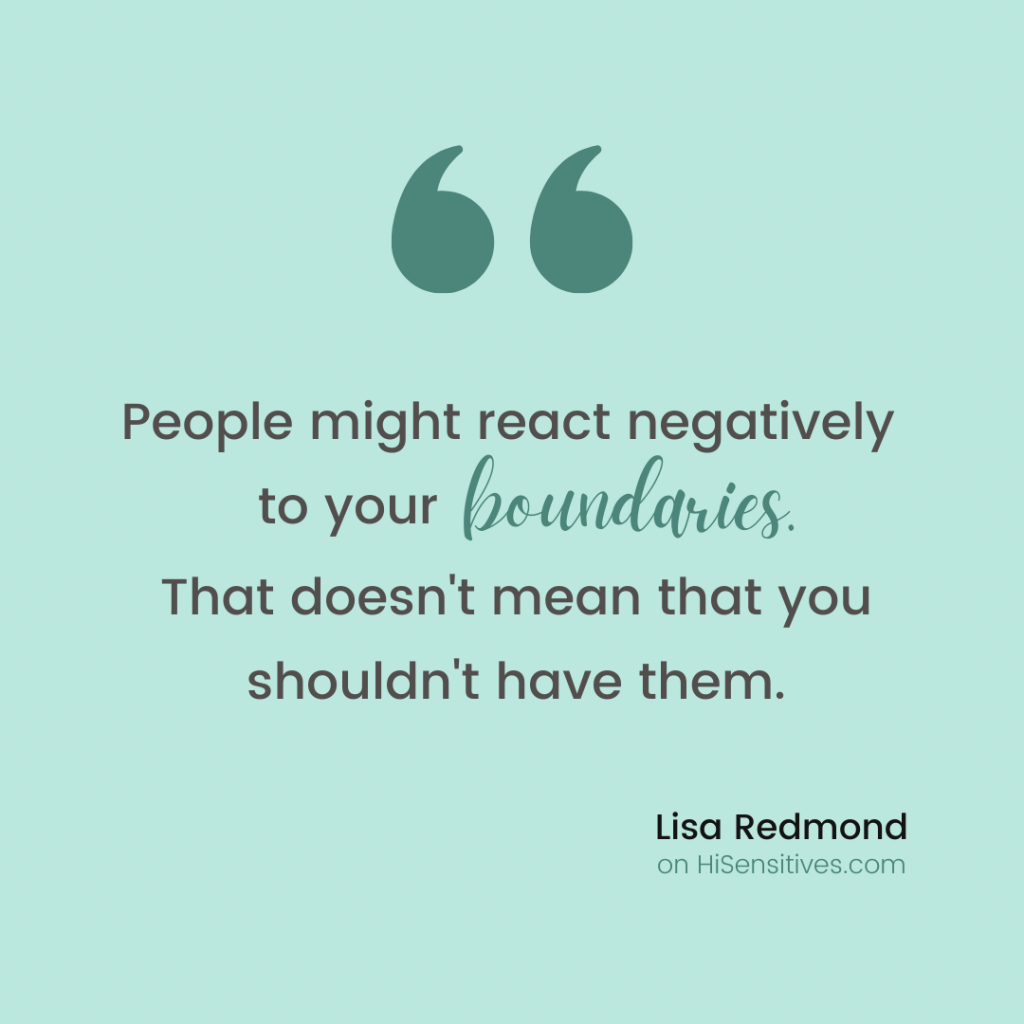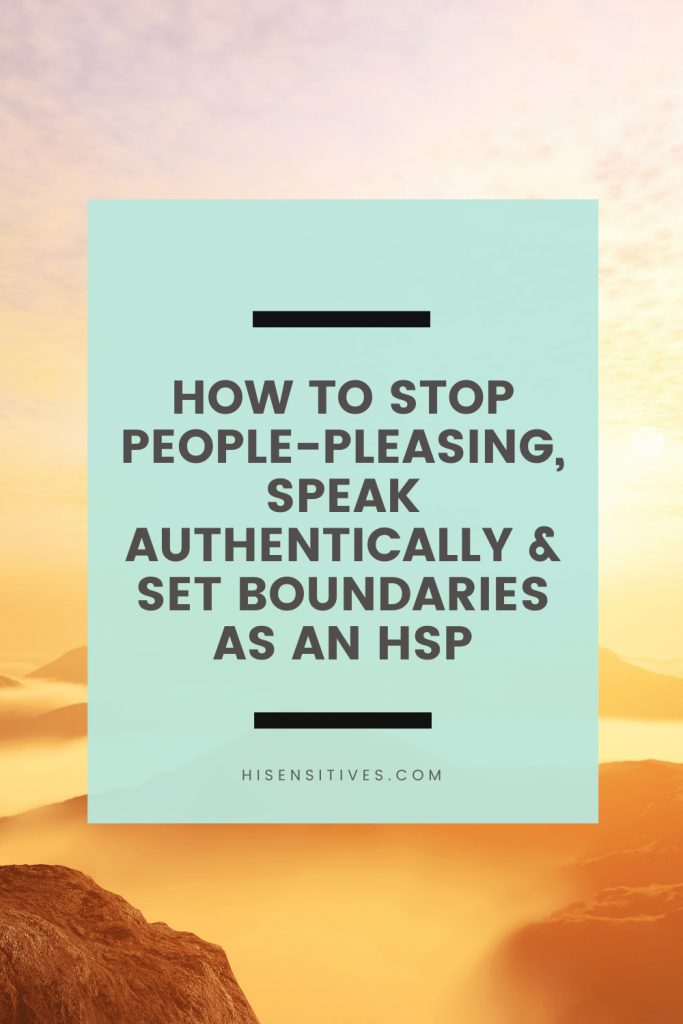In this article guest writer Lisa Redmond shares how she overcame people-pleasing and learned to speak her truth and set boundaries with others.
Estimated reading time: 11 minutes
Ever since I was a child I was aware that I was different.
More ‘feely’, deeper, more connected to the spirit world, much more sensitive than others around me. I was always wandering off and talking to ‘imaginary friends’.
I craved connection more than anything. Being so different from my family of origin, I felt like there was something wrong with me.
As I grew up I developed strong friendships and bonds with people around me. Also, I found my sense of belonging there.
The Consequences Of My Attunement To Others Without Having Boundaries
Because I was so attuned to how others felt and had no real sense of self, I started to develop codependent and people-pleasing tendencies.
I would bend over backwards for people who would give very little in return. I was terrified to ever disagree with my friends or speak up about what I wanted.
When I got into romantic relationships I would completely lose myself trying to be loved and ‘chosen’ by them, without any regard for my own needs. At work I was taken advantage of and treated badly by employers because I didn’t know how to say no or speak up.
I lived in constant anxiety of being fired or rejected, because it would validate my deepest fears that I wasn’t good enough.
Also, I knew I was a sensitive and nice person and I believed that I could never be ‘tough’ enough to speak up and stand my ground.
Consequently, I had no understanding that healthy relationships needed boundaries. I ended up so burned out and disconnected from myself that I started to pull away from people and isolate myself, as a form of self protection.
I knew that whenever I was around others I would people-please and abandon myself, and the only way I knew how to keep my sense of self was to disconnect from others.
What I Learned From These Challenges
As with everything, we learn through contrast, and things had to get really low for me to realize that I couldn’t go on the way I’d been living. It wasn’t healthy for me or my relationships. That’s when I started to learn about boundaries and why they are so important.
Over the next few years I dove deep into personal development. I went to therapy and consumed hundreds of hours of personal development content. I started to heal my traumas, developed self love and began showing up more authentically in my relationships.
Here’s what I learned along the way:
People-Pleasing Damages Your Self-esteem
When you are constantly denying your reality in favour of someone else’s, you send the message to your subconscious that you aren’t as important as other people.
This can massively damage your self-worth, which then furthers the codependent cycle of looking outwards for validation.
People-Pleasing Is A Maladaptive Coping Strategy, Rooted In Control
I used to equate people-pleasing with being ‘good’. I thought that it made me a nice person because I was always trying to help others by putting them above myself. Anything that our ego attaches to being ‘good’ is incredibly hard to shift.
When I started to learn more about people-pleasing (mostly through Christine Hassler’s podcast), I realized that my people-pleasing habit was completely selfish, because it came from my inability to face conflict.
It was more about controlling other people’s view of me than it was about being genuinely available for them.
This helped me to shift into authenticity, because I realized that that is what healthy relationships actually require.
Boundaries Are Kind
Before I learned to set boundaries, I used to think in such polarities.
I thought that I could be ‘tough’ and have boundaries or be ‘kind’ and be a doormat. Now I see that boundaries are kind.
They’re about honestly letting people know where you stand and trusting in their own resources to handle that.
It prevents resentment, miscommunication and bad energy between people, and that feels a lot kinder to me.

People Might React Negatively To Your Boundaries – That Doesn’t Mean You Shouldn’t Have Them
When people are used to you playing a certain role in their life, they might be unhappy when you start to change that role.
Other people’s resistance can be an uncomfortable side effect of setting boundaries, but it doesn’t mean that you shouldn’t set them.
In fact, I’ve found the people who react most negatively to your boundaries are the ones who have none themselves, and are usually the people you need them with the most.
We Create The World We Want To See By Modeling Healthy Behavior
Setting boundaries gives other people permission to do the same. By advocating for our needs, we teach people how to treat us.
This also models boundaries for others and shows them that they too can speak their truth.
When I struggle to have hard conversations or set boundaries, I remind myself of my values.
I want to live in a world where people can be their authentic and honest selves. Therefore I need to create that world through how I show up in my relationships.
What Setting Boundaries Did For My Overall Well-Being
Setting boundaries has completely changed my life. I’m so much more secure in myself. I no longer isolate because I trust myself not to self abandon.

My relationships are much more fulfilling and I don’t have the same resentment or anxiety underpinning my interactions. I’ve learned that I can stay connected to others while remaining connected to myself.
I’m so passionate about self-love and relationships that I even created a coaching business around it.
So many people vacillate between hyper-independence and codependency, believing that they need to choose between themselves and other people.
I know the pain of that, because I used to believe the same thing.
What I’ve learned is that real joy comes from learning the skills and building the self-love that allows you to have both.
After all, that’s what we truly deserve.
If you’d like to learn more about setting healthy boundaries, you may enjoy reading the book ‘Boundaries For Empaths: A Life Changing Guide to Set Healthy Boundaries as an Empath or Highly Sensitive Person and Enforcing Your Standards‘.






